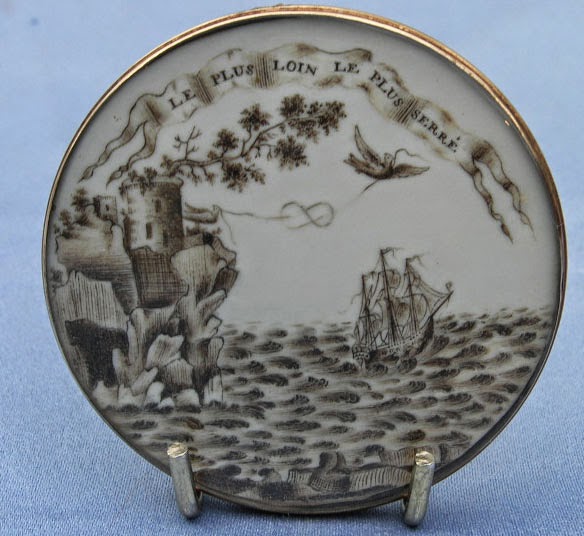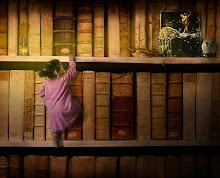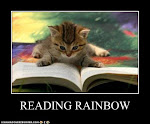I'm not teaching children's/YA lit classes this year, for the first time in more than two years. Of course I write my syllabi to play to my strengths, and so I include Alice and Peter Pan, which is always a delight to teach because it's just so weird.
Today was the last day of Peter Pan discussion, and, as often happens, students expressed some of the usual claims against critical interpretation. One student referred to the text as a "fairy tale," which is technically inaccurate but theoretically quite interesting; "myth" might be a better term, since Peter is a mythic character, to himself and everyone else. I tend to think somewhat strictly about the definition of a fairy tale; there's a category of story, with character types and plot structures of its own, that comprises fairy tales, and anything else must fit into some other category. But what if I expand my definition? What might we get if we play around with the idea of "fairy tale," not just as a formal designation but as a kind of reception practice? I think there's something there, though I'm not sure what.
One of the biggest challenges in teaching literature to non-lit students, to non-majors, to non-readers, is convincing them of the value of critical interpretation. Most of my students throughout my teaching have been non-majors; they've been psych majors, and biology and engineering, and political science, and business, and nursing, and a few rare history majors. I get a scattering of writing majors as well, but their approach to reading literature also tends to have its own bias; they read, in part anyway, to learn and study their craft. This can make for staggeringly good class discussion, as when one writing major pointed out a strange flaw in Sarah Dessen's Someone Like You. This book, he said, has no adjectives. He pointed to a passage that recounts the protagonist's birthday; she tells us she received "a keychain" from her best friend. The writing student said: "just a keychain? why not a keychain shaped like a pig? or a joke keychain? it's a detail - the mention of the keychain - that totally fails to tell us anything about any of the characters."
This launched us on a discussion of the Missing Adjectives in the book, and how that had a kind of flattening effect - it was great.
Other writers get wrapped up in defending the intention and prerogatives of the author no matter what; those often stem from a writer's own anxiety about her work being mis-read, misunderstood. This I can appreciate, but is also a critical and interpretive dead end.
But the overwhelming criticism - the biggest block I have to chip away at - is the idea that the texts are "just stories. just entertainment. just a kid's book."
In discussing Peter Pan in class, I asked the class something to the effect of "how do we feel about Peter's fate, his never-growing-up-ness, by the end of the novel? Is it good, bad, neutral?"
Several people responded with varying answers (and how I love when they have diverse reactions), and one said "it's not like he's a real person." She seemed to be suggesting that this unrealness made answering my initial question almost moot: how can you form an opinion, or an emotional reaction, about a person who doesn't exist?
In some ways, it's not a bad question, though for me as a reader it's both frustrating and baffling. But I think my bafflement is a mirror image of that (and other) student's frustration. My sense of why read, why books, why stories, has so many facets and many of them have to do precisely with my opinions and emotional reactions to nonexistent people. I read for plot and pleasure, of course, but my brain also runs a kind of critical background scan all the while, thinking about representations of women and children and play and reading and toys and so on. For me it makes almost NO sense - in an almost-literal way - to not do this kind of critical reading. But for today's student (and many like her who have expressed identical positions), I think her worldview, her brain, is calibrated in such a way that it makes NO sense to do that kind of critical reading.
It's a really fundamental difference in how one sees reading and story. Obviously, I'm terribly biased and think that my way is the right/best way, but this isn't a question with right or best answers. In the way that I think and see in stories and texts, other people think and see in numbers or logic patterns or mechanized forms. I'm essentially incapable of thinking in numbers, and I shook off my mathematical training as quickly as I could (after junior year of high school, I let it all slide out of my mind). For other people, including students like these, they did that with their english classes.
The difference, I think, comes in how we handle being confronted with the opposite of our way of thinking. I sulked through math classes, and repeatedly asked my parents why such a hideous thing was being inflicted upon me, since it clearly had no practical application (don't know why I was a math-only utilitarian, but there it is). My parents' answer: it's training different parts of your brain.
This is actually an excellent answer, possibly the only answer, to why am I being forced to learn/do this?
It was not satisfying to me as a 15-year-old, but even fairly early on in college, once the book-nerd part of my brain was being trained effectively for the first time ever, I began to understand and appreciate the idea of math training.
If I got plunked into a math class of some kind, I don't think I'd put up a wall of resistance. I wouldn't, though I'd be tempted, to pull a Calvin & Hobbes "math atheist" move. Being a hippie-dippy liberal-artist literature nerd has the effect of making me open to multiple interpretations, lots of possibilities, to the idea that there are no hierarchies or essential right/wrong, good/bad binaries.
But science-oriented people often function in the opposite way. They do see hierarchies and right and wrong binaries. These are the students who ask, at the end of a class, "so what DOES this book mean?" as if there was one simple answer. I always turn that question back to them, and sometimes I can see their frustration: "you're the teacher, why won't you just tell me the answer?!"
And maybe, as a corollary, their minds work in such a way that if there is no answer (no right answer), then that thing loses a lot of its meaning and value. So a text becomes "just a story," just a thing with no intrinsic value, a thing that is good or useful only for the length of time it takes to read. Once you set the book down, it's a done thing; it's used, used up, and you'd no more spend time pondering it than you would spend examining a grubby paper towel.
So the challenge then becomes how can you break through that, even for a bit, even just for a semester? How can you bring those students to a position where they are at least willing to start from the belief that there IS more than a story?
I wonder, sometimes, at the students who come in on day one, and leave on the final day, firmly believing that it's just a story. They must feel they've wasted their time terribly. But it also makes me wonder what is at stake for them; what is the fear/anxiety/resistance an expression of? What would it mean for them to accept the multiplicity of meanings, the idea that books can move people, that they can have an affect and an effect, that they can reflect and shape cultures?
Many of these "resistant" students are quite bright; they're not apathetic slackers. Very often, they're extremely smart and good at their fields - the engineers, the pre-med kids, the math majors, etc. So I can't chalk up their resistance to a lack of intellectual ability, or even a lack of curiosity.
Is it that for them to accept that their are many truths, and no fixed Truth, is as horrifying as it would be for me to accept that there is just a fixed Truth?
If this is the case, then, how do I negotiate some kind of middle way, some path that isn't horrifying to either of us?
It's a complicated question, and though my kneejerk reaction is to simply say: Well, this is a disciplinary issue; in literature, it's truths not Truth, and you'll just have to suck it up.
But then I think: how would I feel, dropped into a class where my instructor was insisting that it's Truth, not truths?
I do wonder how other instructors deal with this; how do you go about convincing those devout unbelievers that literature has value at many levels?
Monday, November 14, 2011
Subscribe to:
Posts (Atom)



